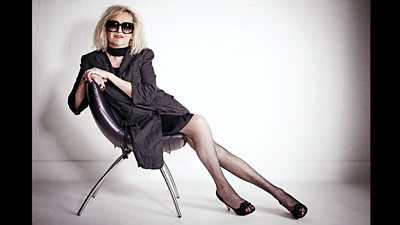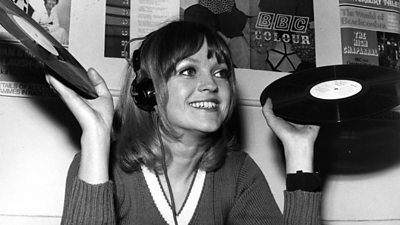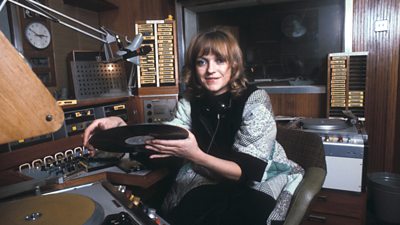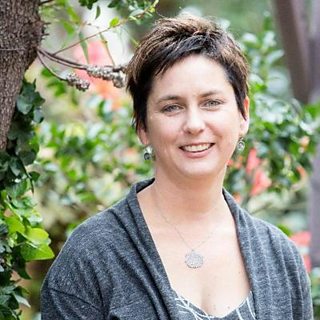Annie Nightingale is Radio 1's longest standing DJ, the first woman to present the Old Grey Whistle Test, and instrumental in the careers of generations of musicians. As Lucy Robinson explains, it's a story that exemplifies the importance of listening to and supporting women in the media.

Nightingale's life story covers all the major popular cultural markers since the Second World War; from listening to Richard Burton narrating Under Milk Wood, to Radio Luxembourg and hanging out in Soho with the art school scenesters and Beat poets.
She has fronted her own boutique, run fashion shows, managed a band, and teased John Lennon, and she helped break David Bowie, Ian Dury, Eminem and Primal Scream.
Her ability to spot and support up and coming artists led to the label ‘Queen of the Breaks’.

We tend to take particular notice of the women who come first. When Radio 1 decided that they needed a 'token woman', Nightingale was there, ready and eminently qualified. Her standing as the only female DJ continued for 12 years until Janice Long joined Radio 1 in 1982.
It was not until the 1990s and the 'girlification' of Radio 1 with the likes of Sara Cox, Jo Whiley and Zoe Ball, that Nightingale's exceptionality became her longevity and impact rather than her gender alone.
The radio itself is a reference point in her interviews and memories, beginning with the small white Bakelite wireless bought by her father, through which she listened to ±«Óãtv children's serials, and later, Radio Luxembourg. Her intimate relationship with radio and with the audience was formed at this time:
"The breakaway moment came when my Dad who was always obsessed with tuning the radio in properly and you'd have it on a dial and it would say all these places like Prague and Hilversum which were kind of magic. They might have been on another planet. I didn't know where Hilversum was, or Prague, but these are places you could tune your radio in and it was like a mystery. I still feel that romance. I still feel when you're broadcasting, you don’t know where it’s going, and it could be reaching outer space somewhere and I am still in love with that, completely." - Annie Nightingale, interviewed by Professor David Hendy, London, 9 February 2018.
That small radio, says Nightingale, gave her the power to listen to her own music, independent of her parents. This seems to sum up that post war generation, the beneficiaries of their parent's generation, who were able to use those benefits to develop their own lives and styles. It also directly relates to the inclusive intimacy of her presentation style.
Listening to that radio, she felt that the pirate DJs she heard were talking just to her: "Once I had my own little radio, then I was in my own world, and it was just me and the radio. So anyone who was speaking out the radio was talking to me," she told Russell Davies in a ±«Óãtv Radio 2 interview.

The experiences that Nightingale reiterates in her interviews and writing are the stories that matter. She has often talked about how she shifted from managing a band to presenting a pop music programme on television, about how she was initially locked out of the ±«Óãtv, confronted by sexism in ways that she had not experienced as a print journalist.
She describes the independence of being an evening DJ compared with a daytime presenter tied to the playlist, and mastering the technical aspects of broadcasting. Each of these stories maps change, reminds us of who helped (and who didn’t) and demands that we remember the work of all the women who came first.
There is a long history to forgetting that women have ever stood on a stage, or driven a mixing desk before. When Nightingale talks about women, the radio and the popular music, she does so in ways that acknowledge the women who were in the industry, and the barriers that they faced.
Nightingale explains what radio does for women, talking about listening and being heard, and how hard it has been for them to find a voice. In a newly recorded interview, she was asked whether she had a distinctly 'female' approach to being a DJ:
In the interview Nightingale recalls her first attempt to get an on-air position soon after Radio 1 was launched. Despite her wealth of experience as a music journalist and TV presenter, she was rejected because of the assumption that DJs were "husband substitutes" speaking to housewives. This story is a useful insight into gendered assumptions behind who speaks, and who listens and for what purpose.
In 1977 journalist Mileva Ross found that although the majority of radio listeners in the UK were women, it was generally believed that women preferred men on the air, and that at Radio 1 and 2, "the old sexist way of keeping women as the silent sex, to be talked to but not heard, has gone virtually unchallenged".
Whereas Nightingale knew that women listeners wanted to hear women, and - as her own career showed - not all women stayed at home. She reminds us that it is not that women didn't ask to be allowed behind the mixing desk or mic - they were actively "locked out".
Nightingale's experience of being asked by Vicki Wickam, producer of ITV pop music programme Ready Steady Go! to present a new sister programme called That's for Me has important resonances. She recalls being an accidental careerist, and offers examples of women offering chances to other women, when the doors were shut elsewhere.
It is a narrative of visibility despite the structures, of a star, a manager, and a journalist presenter. In this new interview, Nightingale talks about bringing a journalistic sensibility to her work as a music presenter on television:
Nightingale's taste has marked generational shifts. She has spotted and supported waves of popular music genres: prog rock, German electronica, punk, acid house and the warehouse party scene, as well as grime and dubstep.
As the presenter of the Old Grey Whistle Test from 1978, Nightingale was a powerful influence on British music culture:
Beyond being an exceptional woman in a time of historical change, Nightingale's stories are those of women in popular music journalism and radio.
One final story seems to sum up what Nightingale has done for us as historians. She has often referred to the importance of the guiding life lesson that she learnt at her convent school, along with her love of Shakespeare:
"it's best to die than tell a lie… in a way your voice gives yourself away, I can't tell lies on the radio, my voice would give it away."
Written by Professor Lucy Robinson, University of Sussex, with Dr. Jeannine Baker, Macquarie University.


